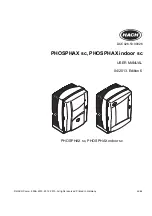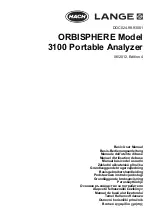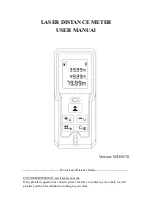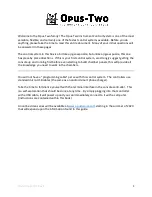
Section 5. System Overview
60
A library of sensor manuals and application notes are available at
www.campbellsci.com
to assist in measuring many sensor types. Consult with a
Campbell Scientific applications engineer for assistance in measuring unfamiliar
sensors.
5.1.3 CR800 Wiring Panel
The wiring panel of the CR800 is the interface to many CR800 functions. These
functions are best introduced by reviewing features of the CR800 wiring panel.
The figure
Wiring Panel
(p. 35)
illustrates the wiring panel and some CR800
functions accessed through it.
Read More!
Expansion accessories increase the input / output capabilities of the
wiring panel. Read
Measurement and Control Peripherals
(p. 311)
for more
information.
5.1.3.1 Measurement Inputs
Hard-wired measurements require the physical connection of a sensor to an input
channel and CRBasic programming to instruct the CR800 how to make, process,
and store the measurement. The CR800 wiring panel has the following input
channels:
Analog Voltage — 6 channels (
Diff 1
to
3
/
SE 1
to
6
) configurable as 3
differential or 6 single-ended inputs.
•
Input voltage range: –5000 mV to 5000 mV.
•
Measurement resolution: 0.67 µV to 1333 µV
Period Average — 6 channels (
SE 1
to
6
)
•
Input voltage range: –2500 mV to 2500 mV.
•
Maximum frequency: 200 kHz
•
Resolution: 136 ns
Note
Both pulse-count and period-average measurements are used to measure
frequency output sensors. Yet pulse-count and period-average measurement
methods are different. Pulse-count measurements use dedicated hardware — pulse
count accumulators, which are always monitoring the input signal, even when the
CR800 is between program scans. In contrast, period-average measurement
instructions only monitor the input signal during a program scan. Consequently,
pulse-count scans can usually be much less frequent than period-average scans.
Pulse counters may be more susceptible to low-frequency noise because they are
always "listening", whereas period averaging may filter the noise by reason of
being "asleep" most of the time. Pulse-count measurements are not appropriate for
sensors that are powered off between scans, whereas period-average
measurements work well since they can be placed in the scan to execute only
when the sensor is powered and transmitting the signal.
Period-average measurements utilize a high-frequency digital clock to measure
time differences between signal transitions, whereas pulse-count measurements
simply accumulate the number of counts. As a result, period-average
measurements offer much better frequency resolution per measurement interval,
Summary of Contents for CR850
Page 2: ......
Page 4: ......
Page 6: ......
Page 26: ...Table of Contents 26...
Page 30: ...Section 2 Cautionary Statements 30...
Page 32: ...Section 3 Initial Inspection 32...
Page 35: ...Section 4 Quickstart Tutorial 35 Figure 2 Wiring panel...
Page 55: ...Section 4 Quickstart Tutorial 55 Figure 24 PC200W View data utility...
Page 78: ...Section 5 System Overview 78...
Page 80: ...Section 6 CR800 Specifications 80...
Page 267: ...Section 7 Installation 267 Figure 84 Running average signal attenuation...
Page 268: ...Section 7 Installation 268...
Page 384: ...Section 8 Operation 384 Figure 113 Using the keyboard display...
Page 387: ...Section 8 Operation 387 Figure 116 Real time custom...
Page 388: ...Section 8 Operation 388 8 8 1 3 Final Storage Tables Figure 117 Final storage tables...
Page 389: ...Section 8 Operation 389 8 8 2 Run Stop Program Figure 118 Run Stop Program...
Page 390: ...Section 8 Operation 390 8 8 3 File Display Figure 119 File display...
Page 396: ...Section 8 Operation 396...
Page 402: ...Section 9 Maintenance 402...
Page 450: ...Section 11 Glossary 450...
Page 504: ...Appendix A CRBasic Programming Instructions 504...
Page 526: ...Appendix B Status Table and Settings 526...
Page 530: ...Appendix C Serial Port Pinouts 530...
Page 536: ...Appendix E FP2 Data Format 536...
Page 550: ...Appendix F Other Campbell Scientific Products 550...
Page 565: ......
















































